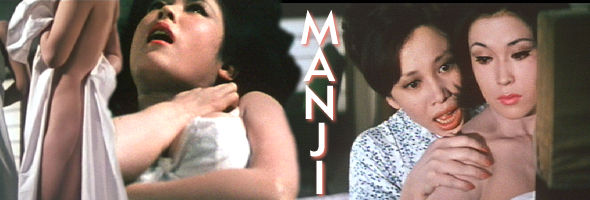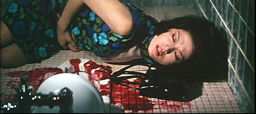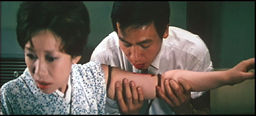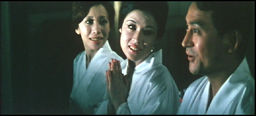
Directed by Yasuzo Masumura
Starring Ayako Wakao, Ky˘ko Kishida, Yusuke Kawazu, Eiji Funakoshi
Fantoma (US R1 NTSC) / WS (2.35:1) (16:9)
"You're so beautiful I could kill you!" "Kill me! Kill me!" Such purple prose positively percolates in this florid melodrama, a hyperventilating Douglas Sirk style yarn about a love rectangle gone horribly wrong.  Our story begins when married, middle class Sonoko Kakiuci (Woman in the Dunes' Ky˘ko Kishida) develops a fixation on beautiful Mitsuko (Floating Weeds' Ayako Wakao), a fellow student in her art class. Rumors erupt that the two women are involved, and soon gossip turns to fact when Sonoko frantically pushes herself onto Mitsuko - who proves to be more than willing. Sonoko is more than forthcoming with her husband, Kotaro (Blind Beast's Eiji Funakoshi), but becomes distraught upon learning that Mitsuko is engaged to the shifty Eijiro (Yusuke Kawazu). Even more strangely, Eijiro knows of the women's involvement and insists they continue their relationship through Mitsuko's marriage. A literal blood oath, double crosses, infidelities galore, and two group suicide pacts ensue before the appropriately morose conclusion.
Our story begins when married, middle class Sonoko Kakiuci (Woman in the Dunes' Ky˘ko Kishida) develops a fixation on beautiful Mitsuko (Floating Weeds' Ayako Wakao), a fellow student in her art class. Rumors erupt that the two women are involved, and soon gossip turns to fact when Sonoko frantically pushes herself onto Mitsuko - who proves to be more than willing. Sonoko is more than forthcoming with her husband, Kotaro (Blind Beast's Eiji Funakoshi), but becomes distraught upon learning that Mitsuko is engaged to the shifty Eijiro (Yusuke Kawazu). Even more strangely, Eijiro knows of the women's involvement and insists they continue their relationship through Mitsuko's marriage. A literal blood oath, double crosses, infidelities galore, and two group suicide pacts ensue before the appropriately morose conclusion.
Based upon a novel of the same name by Junichir˘ Tanizaki (who also wrote Kagi, the source for Tinto Brass' The Key), Manji speeds along so quickly one can only wonder how it will possibly manage to keep up its pace for a feature length running time. Somehow director Yasuzo Masumura pulls it off, from the haunting opening credits through the story itself (told in flashback by Sonoko to a police inspector - thus ensuring the proper tragic air). All of the actors operate at a fever pitch, but the gorgeous Ayako Wakao takes top honors as the central love object, a manipulative, pouting, tender, and perplexing woman whose motives may seem different from one viewer to the next. Italian director Liliana 
 Cavani (The Night Porter) adapted the same novel in 1985 as The Berlin Affair, transposing the tangled story to Nazi Germany with supremely eccentric results. Interestingly, Pino Donaggio's string-laden score for that version strongly recalls Manji's eerie quasi-classical chamber music, which wafts in and out of the story at just the right moments.
Cavani (The Night Porter) adapted the same novel in 1985 as The Berlin Affair, transposing the tangled story to Nazi Germany with supremely eccentric results. Interestingly, Pino Donaggio's string-laden score for that version strongly recalls Manji's eerie quasi-classical chamber music, which wafts in and out of the story at just the right moments.
As with their other Masumura titles, Fantoma has done a thorough job of presenting a rarely seen gem to international audiences. The transfer appears once again to originate from a Japanese production house, as the brightness levels are a bit higher than usual and conform more closely to Japanese standards. Adjust your TV set or DVD player accordingly, but the image quality is top notch in terms of color and detail. The mono soundtrack is also stronger than usual, with even the most ear-splitting dialogue free of distortion. The disc comes with a panting theatrical trailer, the usual filmographies and promotional stills, and extremely useful liner notes by Earl Jackson, Jr. which, among many other things, explain the odd, reversed swastika symbol - "manji" - whose presence on the cover and during the main credits may cause viewers to erroneously expect some sort of oddball statement on lesbian chic fascism.
![]()